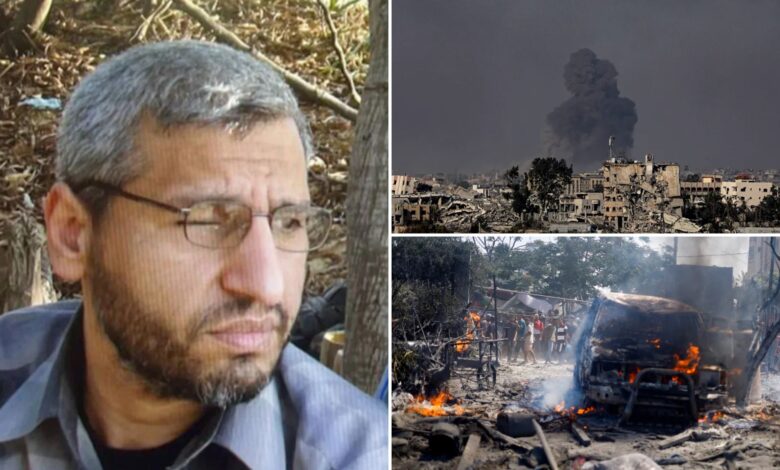Hamas mastermind Mohammed Deif’s possible death is reason to celebrate

Israel has tried seven times to assassinate Mohammed Deif, the military brains behind Hamas in the Gaza Strip.
Jerusalem attempted an eighth time Saturday.
Optimism is growing in Israel that the IDF succeeded in eliminating the mastermind of the Oct. 7. terrorist attack that killed nearly 1,200 people and resulted in the taking of 250 hostages.
Forty-five of those dead were U.S. citizens, and eight Americans – largely forgotten by the White House – are still being held hostage by Hamas in Gaza.
Blame Deif for their deaths and fates. He was the principal architect behind Oct. 7. – and countless other deadly kinetic operations against Israel.
In the world of linguistic homophones, Deif is indeed synonymous with ‘death.’ However, Deif is not his real name.
He was born Mohammed al-Masri in 1965 in Khan Yunis – a city in southern Gaza. 50 years later the evil chemist was designated by the U.S. State Department as a Specifically Designated Global Terrorist.
Deif had been responsible for Hamas’ military strategy in its war against Israel in 2014. That war was a harbinger of what was to come nine years. Hamas kidnapped and murdered three Israeli teenagers – and the IDF responded in force.
Targeting Israeli civilians has long been part of Deif’s deadly playbook. In 1996, he was the primary planner of what became known as the Jaffa Road Bombings, which killed 25 civilians, including two American students studying in Israel – 25-year-old Mathew Eisenfeld and 22-year-old Sara Ducker.
Deif for decades has plotted against and killed Americans.
That he might have met his end in and around Khan Yunis is fitting – and probative of just how evil Deif is.
Not only is it where he was born. But it is emblematic of how Hamas military leaders hide and fight behind Palestinian civilians in Gaza.
Israel had designated that southern area of the strip as a safe zone for civilians. In response, it would appear that Deif, alongside Rafa Salama, the Hamas brigade commander of the Khan Younis military forces, attempted to hide there in and around Palestinian war refugees – men, women and children alike.
Hamas is denying Deif was targeted. Instead, predictably, according to reporting in the Wall Street Journal, Hamas released a communiqué stating, “These false claims are merely to cover up the extent of the horrific massacre.”
Early purported visual evidence of the Israeli strike strongly suggests otherwise. Given the scale of detonation and destruction, the IDF was after something strategically and/or tactically big – as in a Mohammed Deif kind of big.
Jerusalem has vowed to eliminate every Hamas planner and participant of Oct. 7. one way or the other.
Only days after Hamas assaulted Israeli kibbutzim and the Nova Music Festival in southern Israel, Shin Bet – Israel’s shadowy security service – according to reporting in the Jerusalem Post, “established a new unit named Nili, an acronym in Hebrew for “The Eternity of Israel Will Not Lie.”
Earlier in March, the IDF confirmed that it had killed Marwan Issa, Deif’s military deputy widely viewed as Hamas’ No. 3 military commander.
As we forewarned in late December, Hamas’ leaders are all dead men tunnelling – and increasingly more and more of them are turning up dead. Deif may now be the latest.
The timing of the IDF’s attempt to eliminate Deif comes at a critical juncture of ongoing Israeli-Hamas ceasefire negotiations in Doha, Qatar. Only days ago, President Biden had hailed progress on the proposed framework of the multi-phased ceasefire under consideration after Hamas reportedly dropped key demands.
Egypt and Jordan quickly condemned Saturday’s IDF attack – and Jerusalem warned its citizens of a likely response from Hezbollah in Lebanon. Hamas, meanwhile, is claiming more than 70 people were killed in the attack.
Considering Deif’s monstrous history of orchestrating Palestinian terrorist attacks against Israeli and American civilians and his planning of acts of war against Israel and role as the head of the Qassam Brigades, he is a legitimate military target under the rules and laws of war – and his very presence in Khan Yunis among civilians is a war crime.
A Fatah’s spokesperson in the West Bank admitted as much, noting “Hamas must not hide among civilians. Why was Deif in the Al-Mawasi camp?”
Why indeed?
Mark Toth writes on national security and foreign policy. Col. (Ret.) Jonathan Sweet served 30 years as a military intelligence officer.




